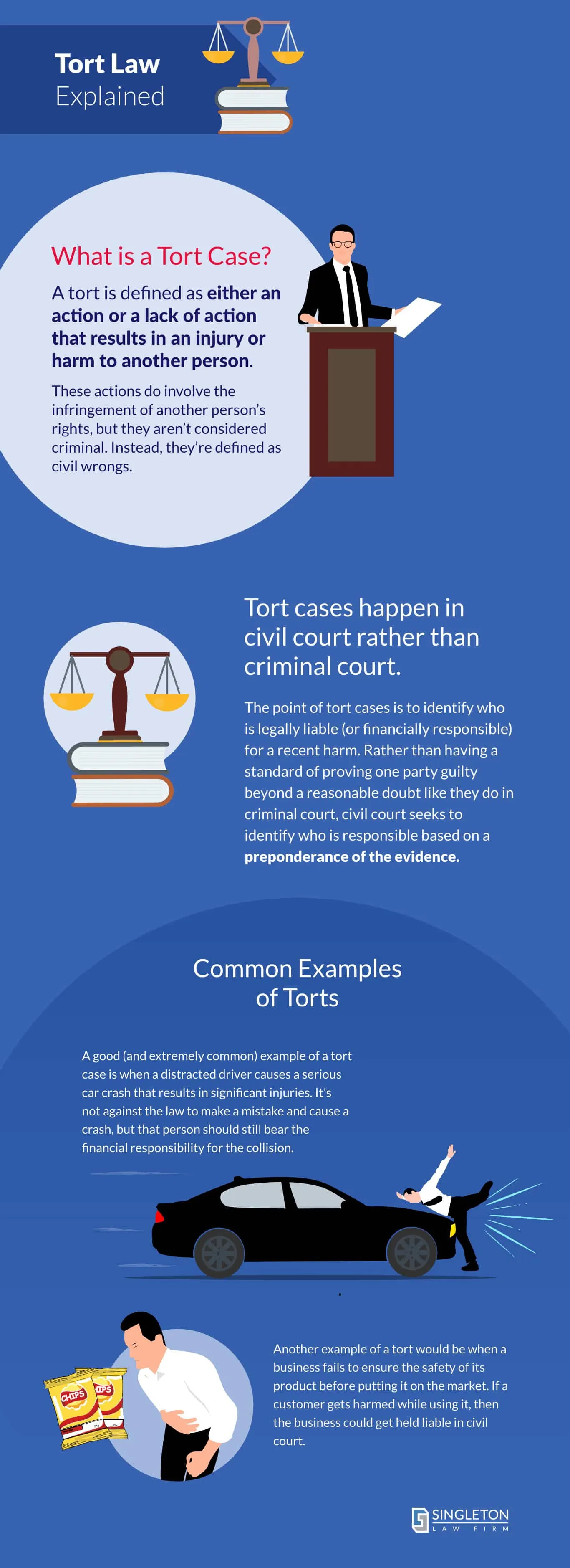What is a Tort Case?
Before we get into the different types of tort liability, it’s important to have a basic understanding of what tort law is and how tort cases work. In a nutshell, a tort is defined as either an action or a lack of action that results in an injury or harm to another person. These actions do involve the infringement of another person’s rights, but they aren’t considered criminal. Instead, they’re defined as civil wrongs.
Tort cases happen in civil court rather than criminal court. The point of tort cases is to identify who is legally liable (or financially responsible) for a recent harm. Rather than having a standard of proving one party guilty beyond a reasonable doubt like they do in criminal court, civil court seeks to identify who is responsible based on a preponderance of the evidence.
Infographics
Scroll down to see our Tort Law infographics:
Examples and Types of Torts
Are you feeling a bit confused by all the legal terminology and archaic descriptions above? To put it simply, torts are harmful actions that aren’t quite against the law but still result in financial or physical harm.
A good (and extremely common) example of a tort case is when a distracted driver causes a serious car crash that results in significant injuries. It’s not against the law to make a mistake and cause a crash, but that person should still bear the financial responsibility for the collision.
Another example of a tort would be when a business fails to ensure the safety of its product before putting it on the market. If a customer gets harmed while using it, then the business could get held liable in civil court.
As touched on above, there are three main types of torts. Let’s break each of them down below:
Intentional Torts
Intentional tots are defined as wrongful actions that are committed on purpose and end up hurting someone. While the perpetrator might not have intended to cause harm, intent is irrelevant in these types of situations.
Some intentional torts are also criminal offenses. If the perpetrator gets charged with a crime, then they’ll face criminal consequences, but they can also face a totally separate civil lawsuit regarding the same action, too. In civil court, that person will experience financial consequences.
Examples of Intentional Torts
Some of the most commonly considered intentional torts include violent acts like battery, assault, false imprisonment, or kidnapping. There are other ways that people inflict harm and distress on to people, though, including acts like trespassing, fraud, invasion of privacy, intentionally causing emotional distress, and even defamation. The current sensationally Johnny Depp versus Amber Heard situation is one example of a defamation trial.
Negligence
Unlike intentional torts, negligence torts aren’t intentional. Rather, these torts are the result of a lack of care towards the other party’s safety. In general, negligence has four basic elements. First, the defendant must have had a legal duty to provide for the other party’s care. Next, that duty of care must have been breached or broken in some way. That breach of duty must have resulted in an accident, and that accident must have caused specific damages. When these elements are present, negligence can be proven and legal liability is established.
Examples of Negligence Torts
The most common type of negligence tort case is a car accident situation. All motorists have a legal duty to provide for other motorists’ and pedestrians’ care. When a driver speeds, gets distracted, or otherwise causes an accident, then they bear the legal liability for the fallout of the accident.
Another common type of negligence tort is medical malpractice cases. These situations happen when doctors fail to uphold their duty of care towards a patient, which results in injuries. Property owners who fail to maintain a safe property and have visitors who injure themselves would also be considered liable in a negligence tort case.
Strict Liability
Strict liability is a third type of tort. This type of tort law states that a party can be found civilly liable regardless of fault or negligence. This type of liability is embedded in the law because some activities are inherently dangerous and can inflict harm. To prove strict liability, one party has to prove that the tort action occurred, and that the defendant was responsible. Intent does not matter.
In other words, when one person willingly engages in a dangerous activity, then they can get held liable if someone else gets injured.
Examples of Strict Liability Torts
One of the most common examples of a strict liability tort case would be an animal attack. If one person owns a dangerous dog that bites another person, then the pet owner will get held responsible for the attack even if the pet owner wasn’t negligent. If someone has any type of wild animal that attacks another person, then they’ll automatically be considered liable.
Another example of a strict liability tort would be when a business creates a defective or dangerous product that hurts a consumer.
Benefits of the Tort Law System
Clearly, quite a few actions fall under the scope of the tort law system. What benefits does the tort system provide to citizens as a whole, though? Is it worth it to pursue a lawsuit in the civil court system? Learn the top five benefits of our civil court system below:
1. Financial Relief for Injured Parties
The main advantage of the current tort law system is that it provides the rightful financial relief injured parties need to recover. After a tort accident, victims often suffer losses in the form of medical expenses, lost wages, property damage, pain and suffering, future medical care, and more. Without the tort law system, that injured person would be left to bear the costs of all these losses on their own, further compounding their undeserved distress.
2. Holds Wrongdoers Accountable
Next, the tort law system ensures that wrongdoers get held accountable for their actions. It penalizes people where it matters most – their wallets. While the criminal court system deals with punishments, this system ensures individuals get held accountable for the financial losses they caused, too.
3. Discourages Civil Wrongdoing
Since the tort law system causes the liable party to bear the losses of the injured party, it discourages people from committing torts. In other words, it encourages responsible parties, like property owners, business owners, doctors, and drivers, to act with diligence and care. Encouraging this type of behavior is crucial because it prevents accidents.
4. Ensures Justice is Served
Another benefit provided by the tort law system is that it ensures justice gets served. This system makes sure that injured victims don’t end up bearing the weight of accidents that are caused by someone else’s lack of care. It helps protect the victim, while also holding the wrongdoer accountable for their wrongful behavior. Further, it helps uphold a high standard of accountability for everyone who takes on a role of responsibility. In a nutshell, the tort law system ensures justice is served when it comes to wrongdoing that falls outside of the scope of criminal law.
5. Puts an End to Disputes
Another lesser recognized advantage of the tort law system is that it helps parties put an end to long-term disputes. When two parties and their legal teams can’t reach a negotiation, the tort law system provides a non-biased third party to help settle the dispute once and for all. Court orders are binding, so the matter will be settled once the case is closed. Often, it can be extremely challenging to come to a reasonable settlement agreement when factors come into play like future medical expenses or an inability to return to to the same field of work. The tort law system helps settle these issues for good, though, by making the best possible ruling based on the evidence provided.
Consult with an Atlanta Tort Injury Lawyer
If you’re currently facing a tort situation like the ones outlined above, then having a legal representative by your side can help you strengthen your claim. The best Atlanta tort injury lawyer will help you collect evidence, prove your claims in court, negotiate with the other party, and represent you if your case makes it to trial. In the best cases, they’ll ensure a favorable legal outcome in your situation.
Are you looking for a reliable and respectable tort injury lawyer in Atlanta? If so, then you won’t have to go far. You’ve landed on the resources section of one of Atlanta’s top tort injury lawyers. Contact our office now to discuss your case in more detail with one of our lawyers.
Tort Law Infographics






